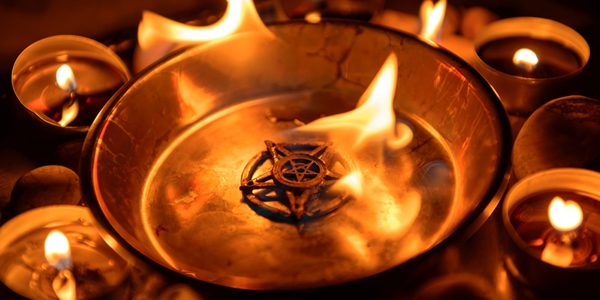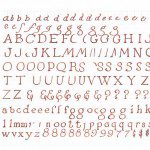[Editor’s Note: This article was originally written by Dana in 2009.]
Over the years, I’ve often heard complaints from teens that older Wiccans don’t take them seriously. You say that we don’t listen and that we don’t respect you, and that we too often refuse to teach you. I know that has to rankle, and I’m truly sorry, but please hear me out.
Now, this is not going to be one of those “When I was your age I had to walk 10 miles through a blizzard every day to go to school” lectures. But I would like for you to understand why our eyes glaze over and we wander away going “Eep! Gloik!” when you attempt to tell us what you know about Wicca. What you know about Wicca and what we know about Wicca are poles apart.

In the years since I first began studying in 1971, the definition of Wicca has changed radically. The kind of person who’s attracted to it has changed radically. And to the older Witch, what you youngsters are talking about when you say “Wicca” does not look or sound anything like what we’re talking about when we say the same word. And both groups believe that their definition is the correct one.
Let’s say that it’s 1971 and some guy is interviewed on the evening news talking about something he calls “Witchcraft.” Not Wicca; nobody was using the word Wicca in public yet. But this witchcraft that this guy on TV described sounds really fascinating. How do you go about satisfying your urge to learn more?
Well, you get yourself down to your local bookstore, and you ask the proprietor where the books on witchcraft are kept. And he gives you this really odd look, and takes you into the back left corner where there’s a shelf marked anthropology. You look at a couple of books about Yoruba and Navajo tribal customs and decide that he must not have understood what you wanted, so you go back and say “No, I mean modern witchcraft.” And he gives you an even odder look and takes you to the back right corner, and sure enough, there are books with the word witchcraft on the spines. But the authors are all Father Somebody and the books all talk about demonology and eating babies and other gross stuff you know can’t be right. So you go home.
Now what? Remember, the Internet isn’t going to go public for another 15 years. The publisher who’ll start putting out all those teen-oriented books on Wicca at the turn of the century is still mostly just doing astrology books. And you don’t know anybody else who’s interested in something this weird.
So you phone the TV station and ask them for the contact information to write to the guy who was talking about witchcraft. After being put on hold forever a secretary reads it off to you. You’re on your way!
Well, no. You write to the guy and ask him how to learn about Witchcraft. And if you’re lucky, in a few months you get a letter back that says:
Dear Teen;
Thank you for your letter. Unfortunately, I cannot help you, as legitimate teachers of the Craft do not accept underage students. I recommend that you read books on mythology, metaphysics and parapsychology, and perhaps when you are old enough, a teacher will appear.
Best Wishes,
Joe Authority
So that’s what you do. You immerse yourself in Theosophy and Rosicrucianism and UFOs, you dabble in Zen and go to the new Hari Krishna Temple that recently opened in a slummy part of downtown. You check out mythology books from the library, and discover that the theme of Atlantis runs through them and most everything else you’re reading as well. You go back and read those books on Yoruba and Navajo tribal customs, and they’re fascinating. You learn to meditate and start having really interesting dreams. You and your best friend do telepathy experiments at night when you’re supposed to be asleep and you think you might have read each other’s minds once. You discover an East Indian import store and start buying incense cones. In bulk. (Your mother worries that you might be smoking pot.)
And you graduate from high school, and you go off to college or get a job or get drafted, and in general get on with your life. But you never really forget your fascination with the occult, as all these interrelated studies are called. You keep reading and meditating, and by now you’ve actually found a useful book or two about what you mean by witchcraft, the stuff that guy on TV talked about.
Then one day when you’re in your twenties you’re in a store or at a movie, and a total stranger looks at you funny and asks, “Are you a Witch?” and you find yourself saying, to this total stranger, “Y’know, I think I am.” And the next Saturday night there you are, at this person’s house, or sitting around a big table at a restaurant, and there are all these other people smiling expectantly at you. They start asking you questions. Why do you want to be a witch? What have you read? And if you’re lucky–if they like you and think you might be a good fit for their group–this time you really are on your way.
They invite you to parties and discussion groups where the conversation is always fascinating but it’s never about politics or movies or sports. You find that most of the members of the group have quite a lot of experience in one or more areas of the occult or metaphysics, the ones you’ve been reading about. Most of them not only read mythology but anthropology and archeology, and at least one is an astronomy geek. They practice herbal medicine and make their own wine. They sit around singing old folk songs you never heard of but they all know by heart. Pretty soon you know them, too. And a year or so later your friend, the one who seems to run things, calls you up and says, “Go to the Army-Navy store and buy yourself a dagger. You’re getting initiated Sunday night.”
Fast forward. It’s 2009. Books on Wicca (as it’s now called) are not only easy to find, they’re hard to avoid. And with perhaps a half-dozen exceptions, there’s nothing in them that would look familiar to that 1971 teen. Where are the references back to the rest of the Western Metaphysical Tradition? The old songs and poems that turned out to have the layers of hidden meaning? What about Atlantis, or the starry wheel of the heavens, or the lost lands of Hy Breasal and Ys? What happened to the work of turning the Wheel? Where are the living Gods and the Mysteries? Where is the frisson of awe? Not in these books, that’s for sure.
The Internet is now a commonplace part of life, taken for granted by most of its users, especially its young users, as the place to find information. Google witchcraft and you could sit there for days following links; the only problem is that the majority of site-owners are obviously just parroting books–too often just one book–and a lot of them appear to have been plagiarized from each other. And they’re mostly all saying that Wicca is whatever you make of it, that the Gods are symbolic constructs that you can mix and match to suit your purpose, that initiation is just a mechanism to keep people out of Wicca, and that the main purpose of it all is to make you feel good about yourself.

The Wicca of 2009 is not the same thing as the Wicca of 1969. In fact, to those of us who have been practicing it for a generation or more what’s called Wicca these days isn’t Wicca at all. It’s NeoPaganism. And we don’t understand why people seem reluctant to call it by that marvelous name.
NeoPaganism is the new religion of the Old Gods, celebrating the Wheel of the Year and the phases of the Moon. It may or may not include the practice of spells and other forms of magic, though even among those who don’t practice it the possibility is always there. It’s something anyone can celebrate, anyone can do, and as the old top-down ‘revealed’ religions thrash about in their death-throes, NeoPaganism is uniquely positioned to emerge as the Religion of the People and of the Earth. It’s amazing.
Wicca, on the other hand, is not even necessarily a religion, not in the sense most people mean. All Wiccans are Pagans, but not all Pagans are Wiccans. Rather than working from a palette of the world’s native deities, Wicca is a priest(ess)hood of a specific God & Goddess whose Names we don’t reveal, but Who can be traced back to certain families in one little corner of the British Isles, the New Forest. It engages in specific small-group rites meant to channel Divine energies to humanity and human energies back to the Divine, and thus maintain the cosmic balance. It has links to the rest of the Western Metaphysical Tradition as well as to the history & mythology of preChristian Britain. It isn’t even actually Celtic except in the sense in which Britons of the 19th Century meant it: that is, natively British and wilder than Saxon. It’s no intrinsically better, or more important or impressive, than any other form of Paganism. And it was never meant to have a lot of members or be popular.
The dismissal some Teen Wiccans perceive coming from some Elder Wiccans has little to do with age and everything to do with definitions and attitudes. By everything you know, Wicca is about Mother Nature and Father Sky and worshipping Them. By everything we know, that’s just the tip of the iceberg: Wicca is an occult path practicing both deific and practical magic. By everything you know, Wicca is light-hearted, anyone who says they’re a Wiccan is one, and anyone who leads a ritual is entitled to call themselves a High Priest or High Priestess. By everything we know, the study of Wicca is long and intense, only initiates are entitled to call themselves a Wiccan, and only those ready and willing to write the Gods a blank check are fit to be a High Priest or High Priestess. And because we were here first, with that definition, we’re not likely to change it. If we did, it wouldn’t be Traditional Wicca any more, and we’re duty-bound to preserve the Craft as it was given to us.
That doesn’t mean we can’t have common ground, or that there’s no room for mutual respect. Treat us and our ways with respect, and you’ll be surprised at the result: most of us Old Farts™ are friendly and eager to teach anyone who’s eager to learn. Just don’t expect us to embrace someone–of any age–as a Craft brother or sister, much less a fellow HP or HPS, who hasn’t been through a Traditional initiation, because by our definition that’s what makes a Wiccan. It’s not discrimination, and it’s not aimed at any one in particular, certainly not you. It makes sure that only those prepared for it are introduced to those Mysteries specific to our Traditions, so that no harm can occur on any plane. And it helps to preserve the Craft and its Mysteries, something that’s more important to us than anyone’s feelings — including our own. You think it doesn’t hurt to have to turn nice people away?
We want to make friends with the Teens in our communities, to mentor you within the limits we’re allowed. But for most of us, our experience has been that the majority of Teen ‘Wiccans’ are so certain that they already know everything about it that they reject what we have to say before they’ve even heard it. Even when you say you want to be taught, when we tell you that part of the process is waiting, most Teens are outta there.
And about that waiting: the truth is that many teens are emotionally and intellectually capable of studying Wicca. But the majority of Wiccan teachers still do not accept underage students. Before you protest, as teens so often do, that it’s unfair, please hear me out. Your ability is not at issue, nor your worthiness.
Part of the reason for a minimum age is tradition, which is very important to us. Part of the reason for that tradition is that specific ages have occult meanings. That’s right: Few people realize it, but there are ancient occult reasons why, in Western culture, the age of majority is specifically twenty-one and not twenty or twenty-two.
Part of the reason is concern for the would-be student: it’s very easy to get totally absorbed into something as fascinating and open-ended as Wicca studies and practice. It’s very easy to let it interfere with what you should be doing in your teens: that is, getting your education and setting out on your life as an independent, self-supporting adult. Not only is allowing that to happen not doing the young student any favors, their teacher/initiator is in part karmically responsible if that student never gets their act together on the material level and winds up impoverished.
But another part of the reason for a minimum age is self-protection. Traditional Wicca initiates cross-sexually; that is, male candidates are brought in by female initiates and vice versa. This, too, is traditional, and there are sound magical reasons as well. The law doesn’t care about tradition or magic. Wicca teachers can run afoul of laws about corruption of minors and custodial interference, and there are cultural and often legal assumptions that the only reason an older person could possibly have for befriending a younger person of the opposite gender is sexual exploitation. Especially in what’s often called a fertility religion! Sigh…
But in the meantime:
Don’t Wait.
Don’t wait for someone else to give you permission or approval to begin actually practicing the things you’ve been reading about. Realize that there’s no better time than now, and begin doing it. The best preparation for any practice, after all, is the practice itself. If you have to take books into your Circle and read aloud as you perform the ritual, if you’re not sure you totally understand what you’re doing (by the way — nobody ever does), it doesn’t matter at this point. The important thing is to be doing the practices. The Gods are not going to smite you for flubbing your lines (if they did, my entire Tradition would be in trouble!) and you’re not going to accidentally invoke something awful.
Do it.
Experience it.
Internalize it.
Become it.

Patheos Pagan on Facebook.

the Agora on Facebook
The Rantin’ Raven is published on alternate Saturdays here on the Agora. Subscribe via RSS or e-mail!
Please use the links to the right to keep on top of activities here on the Agora as well as across the entire Patheos Pagan channel.

















